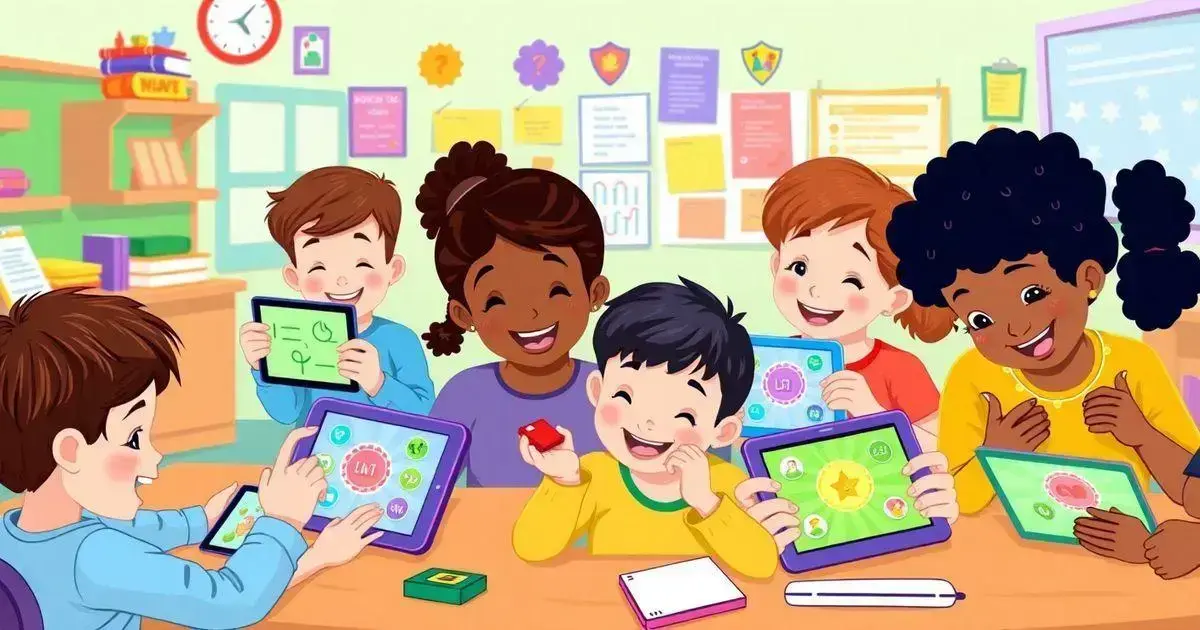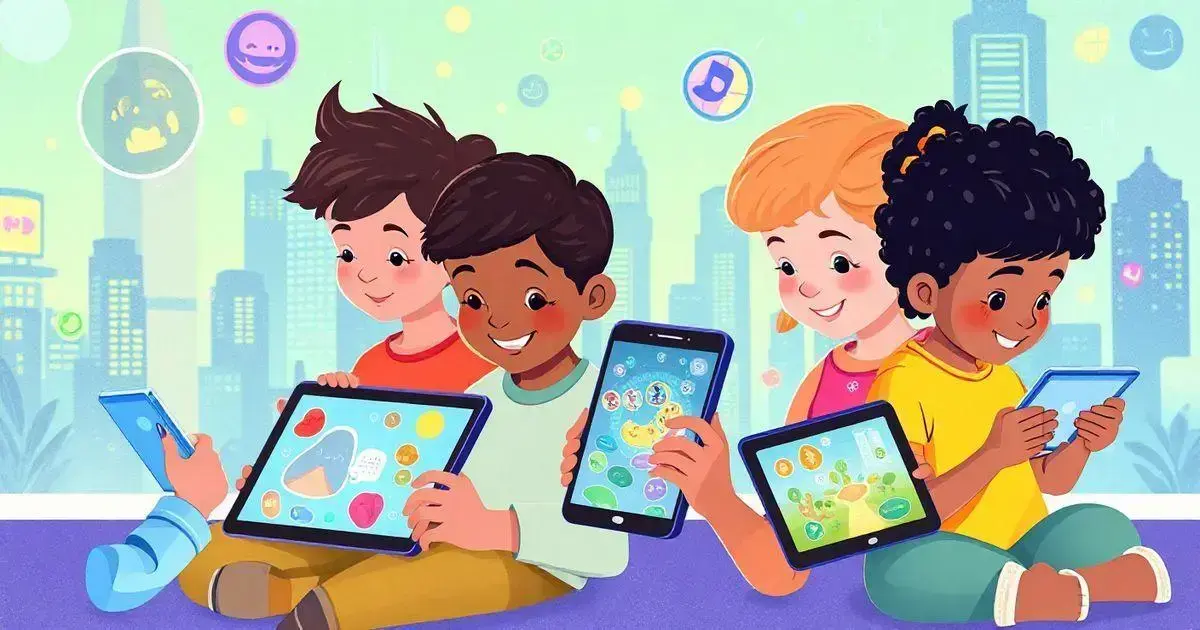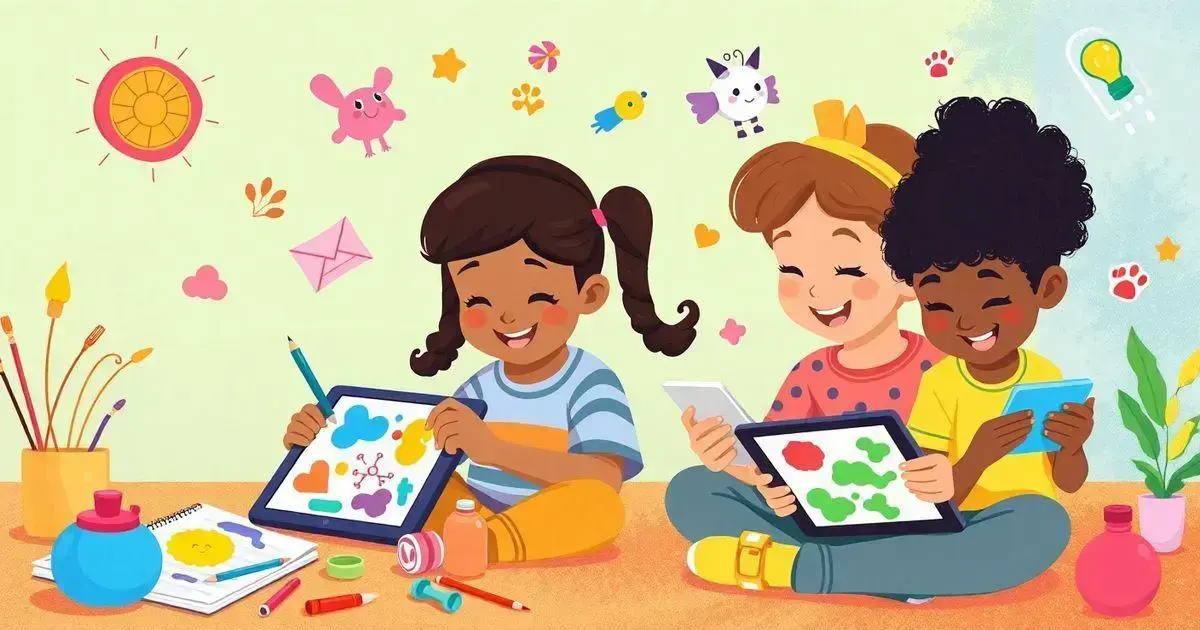Fun apps for kids are a great way to mix education with fun. These apps keep kids engaged while helping them learn new skills. From creative games to educational quizzes, there’s an app for every interest.
They offer a hands-on, interactive approach that caters to different learning styles. Kids can explore subjects like language, math, and art in exciting ways that feel more like play than school.
Curious about the best apps to help your child grow and learn? Keep reading to discover a selection of top picks that will keep them entertained and learning at the same time!
Top 5 Educational Apps for Kids
When it comes to selecting the top educational apps for kids, there are several amazing options that engage learners and promote fun. Fun apps for kids make learning enjoyable by combining entertainment with education, ensuring that children stay motivated while they learn.
Here are five standout choices:
- Kahoot!: This interactive quiz platform allows kids to learn through games and fun trivia. Teachers and parents can create custom quizzes to test knowledge on various subjects.
- Duolingo: A fantastic app for learning new languages, Duolingo turns language education into a game. Kids can practice vocabulary and grammar through fun exercises.
- Endless Alphabet: This app introduces children to new words through adorable animations and interactive activities. It makes vocabulary building exciting and engaging.
- Prodigy Math: Through a magical world, Prodigy Math allows kids to practice math skills while engaging in adventures. Kids love the gameplay and rewards system.
- ABCmouse: This comprehensive platform covers various subjects from reading to math for children ages 2 to 8. It provides a structured learning path with engaging content.
Choosing the right app can make a significant difference in a child’s education. Fun apps for kids not only make learning easier but also keep them entertained, offering a great way to balance education and enjoyment. Consider their interests and learning styles to select the best options that will keep them inspired.
Creative Games to Boost Imagination

Creative games play a vital role in boosting imagination among kids. These activities not only entertain but also stimulate creativity.
Here are some exciting creative games that encourage kids to think outside the box:
- Story Cubes: This game uses dice with pictures on them. Kids roll the dice and create stories based on the images they see. It enhances storytelling skills and imagination.
- Art Challenge: Set a timer and give kids a theme to draw or create. This game pushes them to think creatively and express their ideas visually.
- DIY Craft Kits: These kits provide everything needed to create fun projects. Kids can explore various materials and make unique crafts, fostering creativity.
- Building Blocks: Playing with building blocks encourages kids to imagine structures and designs. They can build anything, fostering spatial awareness and creativity.
- Improv Games: Simple improv games help kids enhance their thinking and creativity. Kids can act out scenarios based on prompts, improving their quick-thinking skills.
Encouraging creativity through games is essential for kids’ development. These activities nurture their imagination and allow them to express themselves in unique ways.
Safety Tips for Kids Using Apps
How Fun Apps Enhance Learning

Fun apps for kids enhance learning by making education engaging and interactive. Here’s how they contribute:
- Interactive Learning: Many apps turn education into a game, providing kids with challenges and rewards. This interactivity keeps them engaged.
- Customizable Experience: Kids can learn at their own pace. Apps often adjust their content based on a child’s performance.
- Diverse Learning Styles: Apps cater to different learning styles. Whether visual, auditory, or kinesthetic, there’s something for every child.
- Instant Feedback: Many educational apps provide immediate feedback, helping kids understand mistakes and learn from them right away.
- Access to Resources: Fun apps for kids often include a variety of resources and activities that may not be available in traditional learning settings.
- Encouragement of Critical Thinking: Apps challenge kids with puzzles and problems that require critical thinking and problem-solving skills.
Utilizing fun apps as learning tools makes education enjoyable and effective, helping children develop skills for the future.
Entertainment Apps for Different Age Groups
When it comes to entertainment apps for different age groups, there are many options available that cater to specific interests and developmental stages. Here’s a look at some popular choices for various age groups:
- Toddlers (Ages 2-4): Apps like Endless Alphabet introduce vocabulary through fun animations. ABCmouse provides a broad range of activities to engage young children with letters and sounds.
- Preschool (Ages 4-5): Games like Duck Duck Moose offer creative tools for storytelling and art. Starfall helps kids learn to read with interactive storybooks and songs.
- Early Elementary (Ages 6-8): Apps such as GoNoodle promote movement and fitness with fun videos. Prodigy Math makes math practice enjoyable through games and fantasy elements.
- Middle Childhood (Ages 9-12): Kids in this group enjoy apps like Stop Motion Studio to create their own animations. Minecraft encourages creativity by allowing them to build and explore different worlds.
- Teens (Ages 13+): For older kids, apps like Duolingo offer a fun way to learn languages. Headspace teaches mindfulness and meditation skills that are essential during stressful school years.
Choosing the right app for your child based on their age and interests can enhance their entertainment experience while supporting their development.
Parental Controls and Monitoring

Fun apps for kids and parental controls are essential tools for ensuring a safe and secure digital experience for kids. Here’s how they can be beneficial:
- Content Filtering: Most devices and applications offer settings that allow parents to filter age-appropriate content, blocking inappropriate websites and apps.
- Screen Time Management: Parents can set daily or weekly limits on the amount of time kids spend on their devices, promoting a healthy balance between digital and physical activities.
- Activity Reports: Many parental control apps provide reports on children’s online activities. Parents can see what websites they visit and how much time they spend on different apps.
- Location Tracking: Some apps allow parents to monitor the location of their children’s devices, providing peace of mind about their whereabouts.
- Social Media Monitoring: Parents can oversee their children’s social media interactions, helping to protect them from cyberbullying and inappropriate communication.
- Setting Boundaries: Parental controls enable parents to set specific times when devices can be used. This can help in creating a balanced routine for homework, socializing, and sleeping.
By using parental controls and monitoring tools, parents can guide their children’s online behavior and keep them safe in an ever-changing digital landscape.
Reviewing Kids’ Favorite Apps
Reviewing kids’ favorite apps is important for understanding their interests and ensuring their safety while using fun apps for kids. Here are some key considerations:
- Engagement: Look for apps that capture kids’ attention. Popular apps often have vibrant graphics, fun characters, and interactive gameplay.
- Educational Value: Assess whether the app offers educational benefits. Apps that combine fun with learning can reinforce important skills.
- Age Appropriateness: Ensure that the app is suitable for your child’s age group. Check the ratings and reviews to find the right fit.
- User Reviews: Read reviews from other parents. They can provide insights into potential issues and highlight great features.
- Privacy Settings: Determine what data the app collects. Make sure there are adequate privacy settings to protect your child’s information.
- In-App Purchases: Watch for apps with in-app purchases. Discuss with your child the importance of not spending money without permission.
By reviewing kids’ favorite apps, parents can help their children choose safe and entertaining options that enhance their learning and creativity.
Future Trends in Children’s Apps

Conclusion
In summary, fun apps for kids serve as powerful tools that combine entertainment with education. By engaging children in interactive and creative ways, these apps foster learning while ensuring safety through parental controls and monitoring.
As technology evolves, future trends will enhance these experiences, incorporating elements like augmented reality and personalized learning. It’s essential for parents to stay involved, reviewing both the content and the features of these apps.
Investing time in understanding and selecting the right applications can lead to a rewarding blend of fun and learning, equipping children with essential skills for their future.

